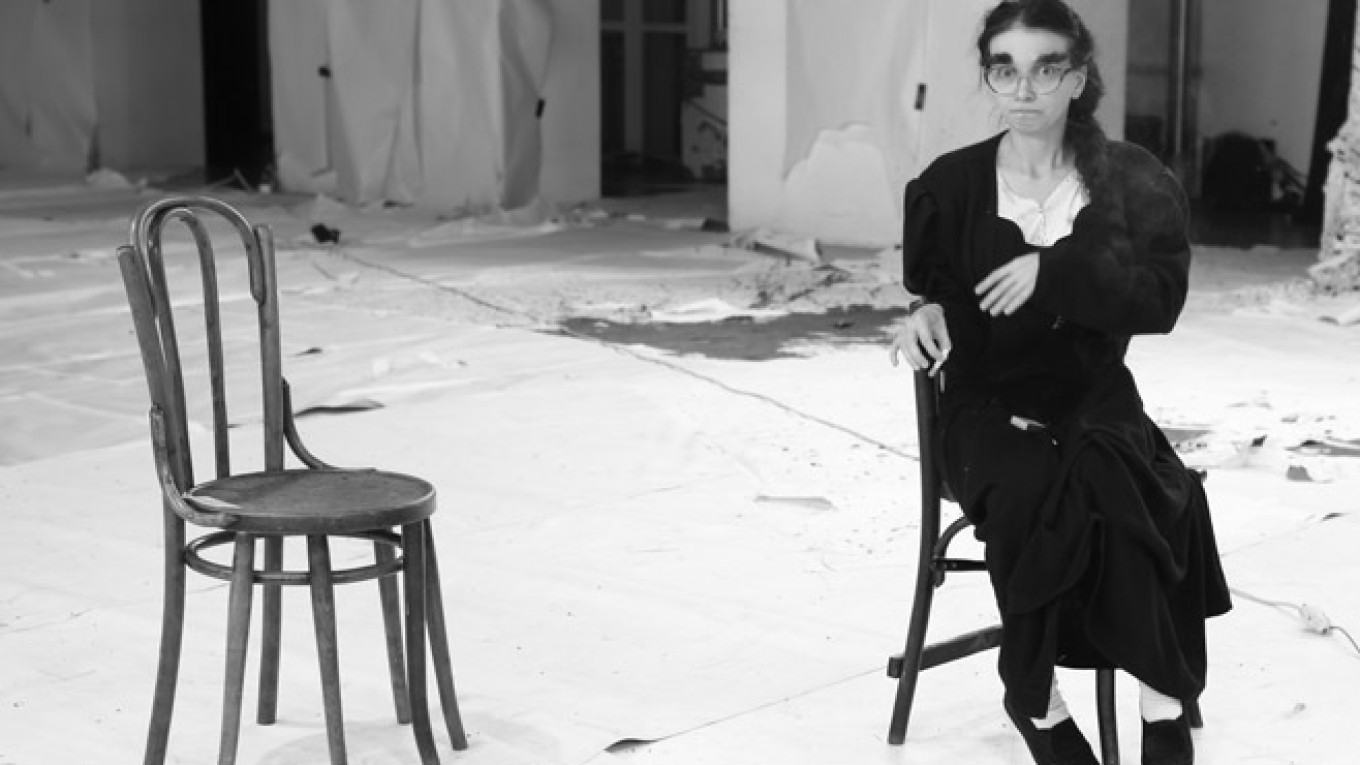A rough play for rough times.
Dmitry Krymov staged Alexander Ostrovsky's old "Late Love" at the School of Dramatic Art and turned it into a bitter, devastating exposé of the world around him.
However, before we go too far with the fire and brimstone, let's also note that this play is funny, inventive, wildly theatrical and deeply moving even in ways Ostrovsky may have intended 140 years ago.
Krymov has his finger on what makes contemporary theater tick. You can't just do one thing anymore. Story is not enough. Social satire is not enough. Irony, character, style and spectacle are not enough. Politics is not enough. You've got to have everything and then some, and that is what Krymov threw into this melodrama about a "no longer young spinster" unleashing pent-up love on an unworthy wastrel.
I'll jump to the end here to make sure it is clear: Throughout all of this production's crazy shenanigans, the heart-wrenching tale of a woman sacrificing herself for love is preserved in (almost) all of its touching detail. It's just that Krymov and his actors take us on a completely unexpected journey to reach that point.
This is sentimental Russian melodrama delivered as Grand Guignol, replete with electrocutions and blood-spattering battles. The wastrel Nikolai first appears as a kind of Eugene Onegin zombie, a dandy with blood and bruises punctuating the handsome features of his face. But mind you, Nikolai, played by Alexander Kuznetsov with a marvelous and incongruous combination of burlesque and sincerity, is arguably the most "realistic" of everyone here.
Maria Smolnikova's Lyudmila, the spinster who impatiently snaps "ruin it!" when Nikolai warns he would ruin her life, comes in a close second, but her character is already reaching the inner stratosphere of caricature. Her huge glasses, furry brows, muddled speech, darting eyes and shuffling gait are all theatrical devices laid bare, just like the set by Anna Kostrikova and Alexander Barmenkov, which brings down all the theater's banks of lights, hangs electrical cords up and down the walls, and sprays black spatters of paint all over the floor and walls.
Nikolai and Lyudmila are surrounded by a delightfully grotesque coterie of family and friends, often with men playing women and vice versa.
Alina Khodzhevanova plays Lyudmila's toothless, frizz-haired father Gerasim, while Yevgeny Startsev plays Nikolai's tree-trunk-sized mother with an unchanging expression of severity drawn on her face by makeup artist Tatyana Shmykova. Konstantin Mukhanov plays the towering, stately widow Varvara Lebedkina, who, when need be, can toss off her gray wig and land punches with the best of them.
Krymov imagined a world in which everything is topsy-turvy. A place where all our expectations, especially about virtue, are defeated. Values? Oh, come now! Aside from the "angelic" Lyudmila — that's what Nikolai's mother grimly calls her after weaseling 50 rubles out of her — the people are cold, cruel, calculating and violent. In fact, violence creates the opportunity for some of the most entertaining and humorous scenes, when fights turn into soccer games and sumo wrestling matches.
To some it's all just a game, this cheating of people, the stealing of money, the abuse of the weak. To others its merely a matter of dumb, as in utterly stupid, curiosity. Nikolai's sickly brother Dormedont (Andrei Mikhalyov) goes around electrocuting tender parts of his body out of inquisitiveness. Hell, if it can't kill you it can't hurt you, and maybe it'll even be fun, huh?
Aside from Smolnikova, the entire cast is comprised of student actors. You wouldn't have known it if I hadn't told you.
Krymov prefixes Ostrovsky's title with a low key "O-h," as if to suggest, "Ugh! Ach! Oh, Lord! What have we gotten into?!" His answer is a harsh, damning picture of a society gone berserk. At one moment Dormedont leaves the pitch-black stage and howls in aching pain; it's enough to make your skin crawl.
But then there is that "angel," Lyudmila, who, death and perfidy be damned, knows how to love. Isn't that the great Russian story?
"O-h. Late Love" (O-i. Pozdnyaya Lyubov). Oct. 9 to 11 at 7 p.m. School of Dramatic Art, located at 19 Ulitsa Sretenka. Metro Sukharevskaya. 495-632-9344, sdart.ru. Running time: 2 hours, 40 minutes.
Contact the author at jfreedman@imedia.ru
A Message from The Moscow Times:
Dear readers,
We are facing unprecedented challenges. Russia's Prosecutor General's Office has designated The Moscow Times as an "undesirable" organization, criminalizing our work and putting our staff at risk of prosecution. This follows our earlier unjust labeling as a "foreign agent."
These actions are direct attempts to silence independent journalism in Russia. The authorities claim our work "discredits the decisions of the Russian leadership." We see things differently: we strive to provide accurate, unbiased reporting on Russia.
We, the journalists of The Moscow Times, refuse to be silenced. But to continue our work, we need your help.
Your support, no matter how small, makes a world of difference. If you can, please support us monthly starting from just $2. It's quick to set up, and every contribution makes a significant impact.
By supporting The Moscow Times, you're defending open, independent journalism in the face of repression. Thank you for standing with us.
Remind me later.


